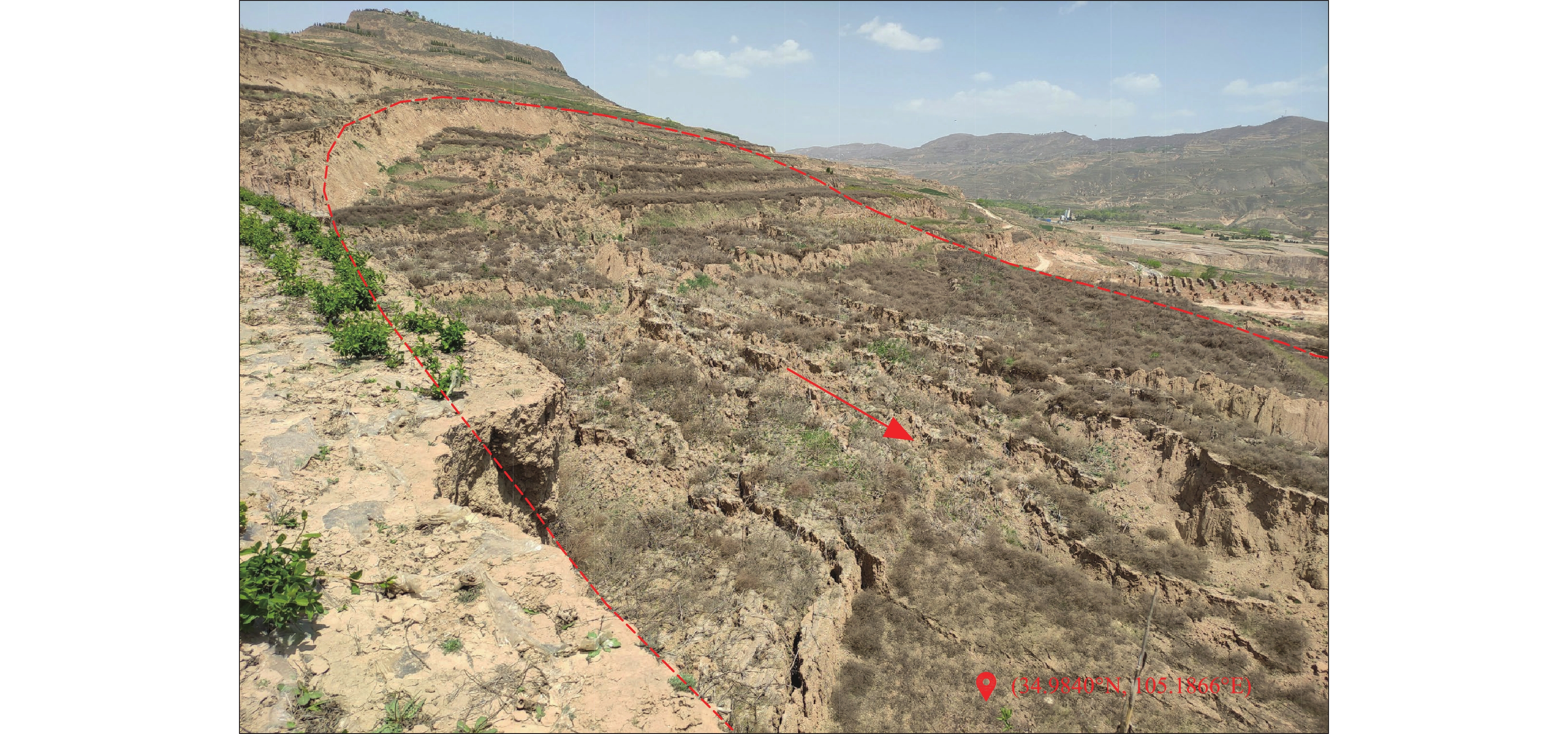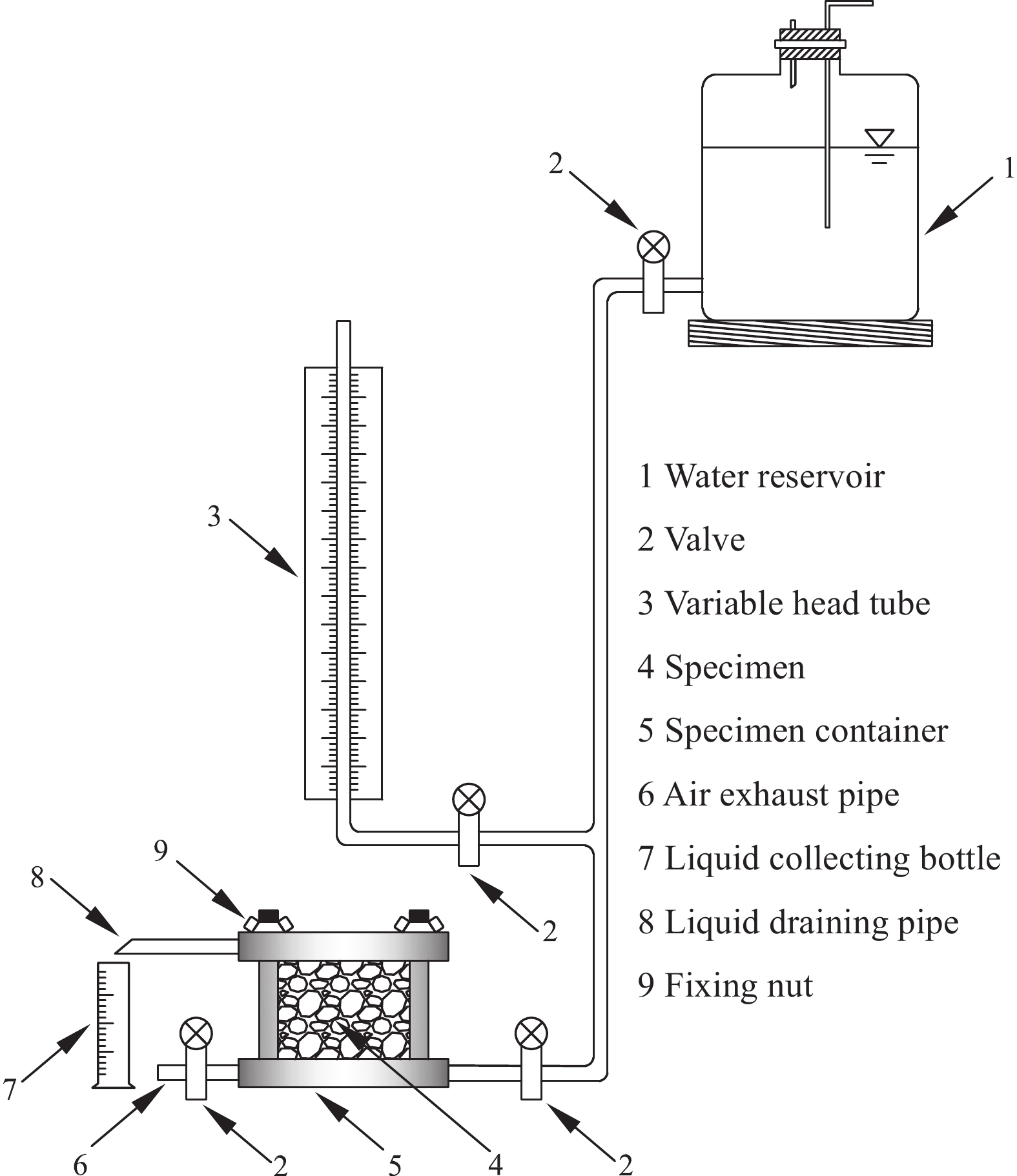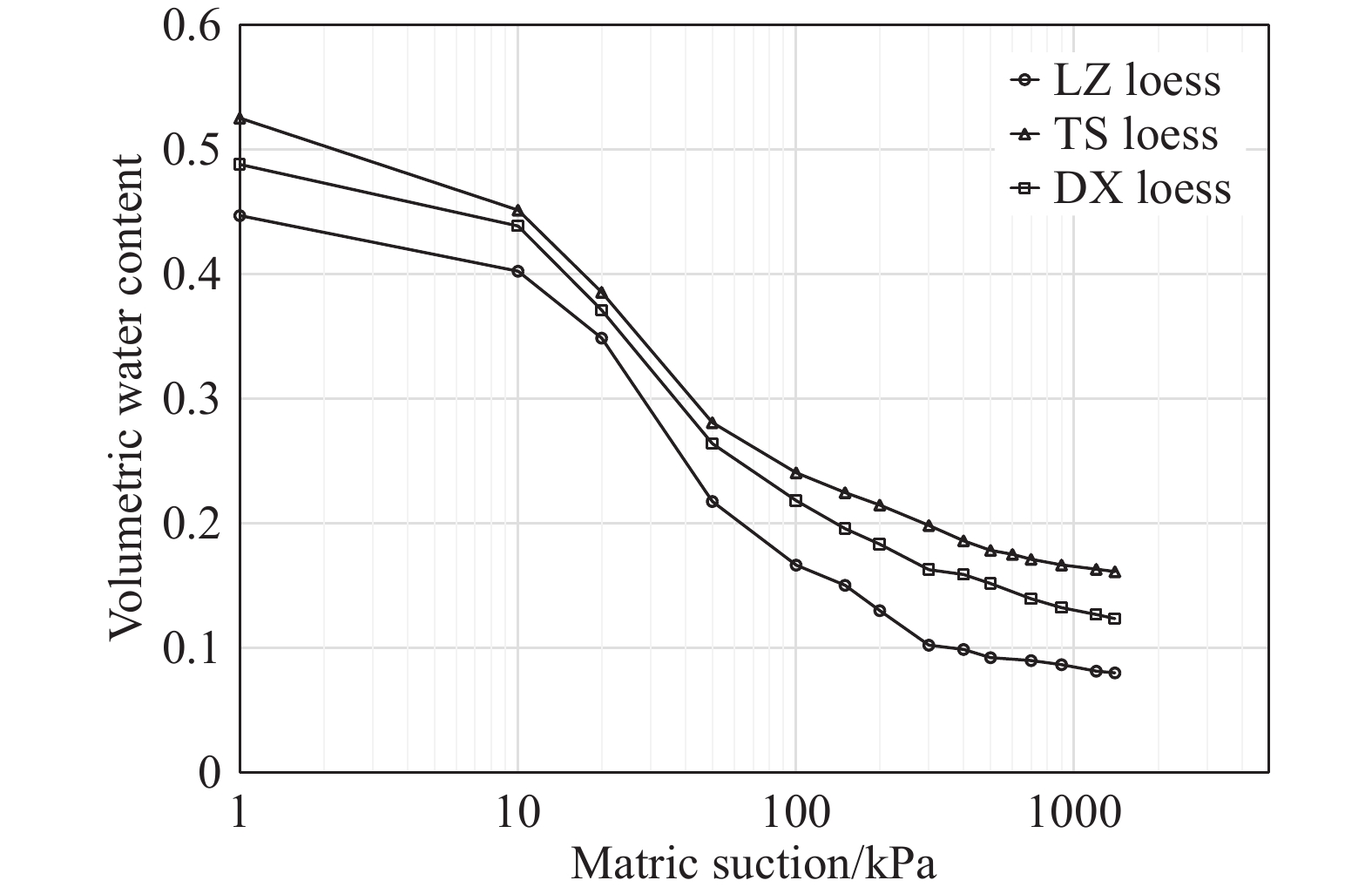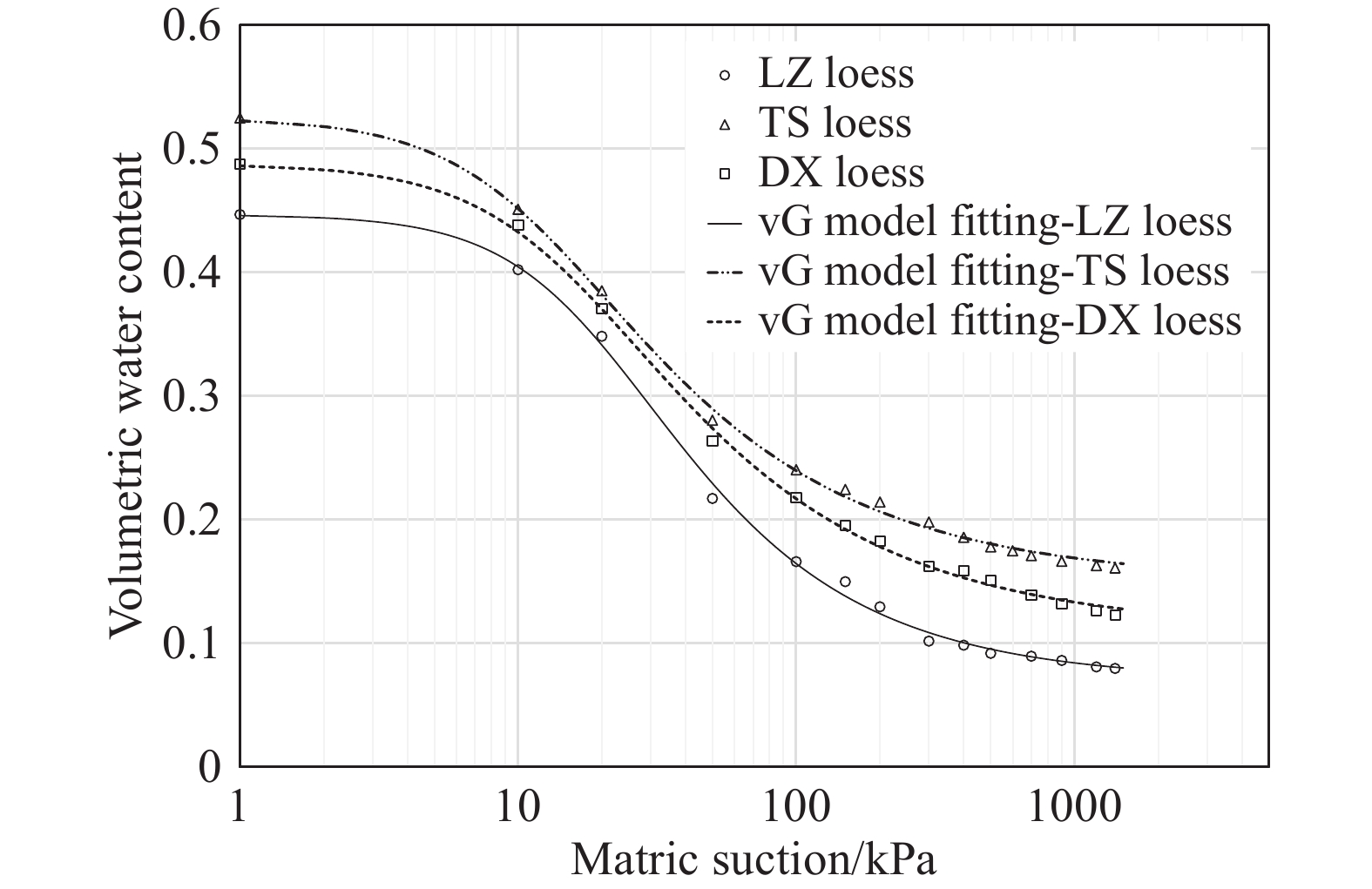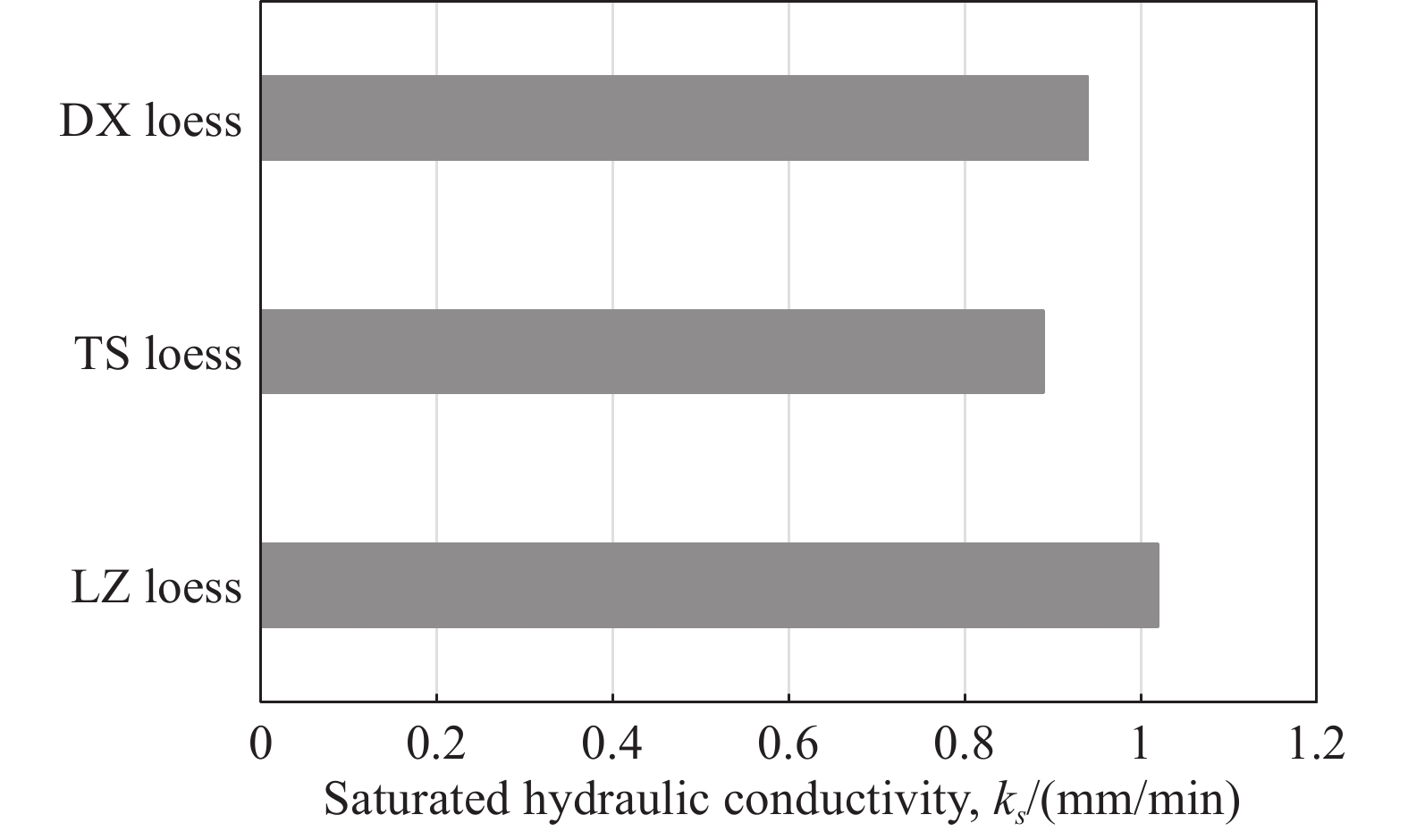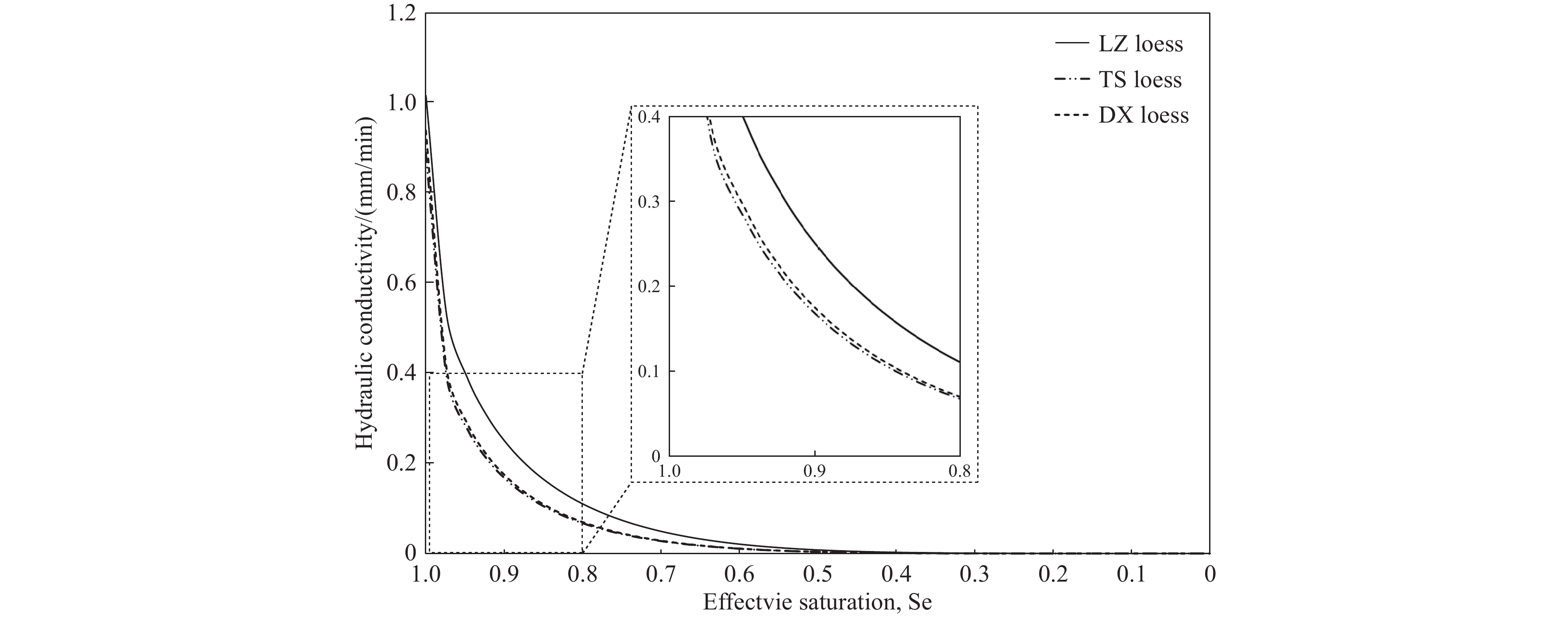| Citation: | Gao-chao Lin, Wei Liu, Xing Su, 2024. Unraveling the hydraulic properties of loess for landslide prediction: A study on variations in loess landslides in Lanzhou, Dingxi, and Tianshui, China, China Geology, 7, 290-301. doi: 10.31035/cg2024006 |
Unraveling the hydraulic properties of loess for landslide prediction: A study on variations in loess landslides in Lanzhou, Dingxi, and Tianshui, China
-
Abstract
Loess has distinctive characteristics, leading to frequent landslide disasters and posing serious threats to the lives and properties of local residents. The involvement of water represents a critical factor in inducing loess landslides. This study focuses on three neighboring cities sequentially situated on the Loess Plateau along the direction of aeolian deposition of loess, namely Lanzhou, Dingxi, and Tianshui, which are densely populated and prone to landslide disasters. The variations in hydraulic properties, including water retention capacity and permeability, are investigated through, Soil Water Characteristic Curve (SWCC) test and hydraulic conductivity test. The experimental findings revealed that Tianshui loess exhibited the highest water retention capacity, followed by Dingxi loess, while Lanzhou loess demonstrated the lowest water retention capacity. Contrastingly, the results for the saturated permeability coefficient were found to be the opposite: Tianshui loess showed the lowest permeability, whereas Lanzhou loess displayed the highest permeability. These results are supported and analyzed by scanning electron microscopy (SEM) observation. In addition, the water retention capacity is mathematically expressed using the van Genuchten model and extended to predict unsaturated hydraulic properties of loess. The experimental results exhibit a strong accordance with one another and align with the regional distribution patterns of disasters.
-

-
References
Brooks R, Corey A. 1964. Hydraulic properties of porous media. Hydrology Paper No. 3, Colorado State University, Fort Collins, CO. Chen WW, Liu W, Wu WJ, Ye F, Su X, Xu H. 2016. Study on the characteristics and origin of Huanancun Landslide. Journal of Engineering Geology, 24, 533–539. doi: 10.13544/j.cnki.jeg.2016.s1.077. Chen JC, Wang LM, Wang P, Che AL. 2022. Failure mechanism investigation on loess–mudstone landslides based on the Hilbert–Huang transform method using a large-scale shaking table test. Engineering Geology, 302. doi: 10.1016/j.enggeo.2022.106630. Cheng YX, Zhang J, Du DJ. 2007. On the relationship between fault and activity and geological hazard in Tianshui area, Gansu province. Journal of Engineering Geology, 15(1), 33–37. Derbyshire E, Meng XM, Dijkstra TA. 2000. Landslides in the thick loess terrain of North-West China. Wiley, Hoboken, 1–288. doi: 10.1046/j.1365-2451.2002.03438.x. Derbyshire E. 2001. Geological hazards in loess terrain, with particular reference to the loess regions of China. Earth Science Review, 54, 231–260. doi: 10.1016/S0012-8252(01)00050-2. Fredlund DG, Xing A. 1994. Equations for the soil-water characteristic curve. Canadian Geotechnical Journal, 31(4), 521–532. doi: 10.1139/t94-061. Gribb MM, Kodesova R, Ordway SE. 2004. Comparison of soil hydraulic property measurement methods. Journal of Geotechnical and Geoenvironmental Engineering, 130, 1084–1095. doi: 10.1061/(asce)1090- 0241(2004)130:10(1084). Guo FY, Meng XM, Li ZH. 2015. Characteristics and causes of assembled geo-hazards induced by the rainstorm on 25th July 2013 in Tianshui city, Gansu, China. Mountain Research, 33(1), 100–107. Hu HJ. 2018. Study on the method for determining the unsaturated permeability coefficient of loess in humidification. Journal of Hydraulic Engineering, 49(10), 1216–1226. Huang QB, Jia XN, Peng JB, Liu Y, and Wang T, 2019. Seismic response of loess-mudstone slope with bedding fault zone. Soil Dynamics and Earthquake Engineering Journal, 123, 371–380. doi: 10.1016/j.soildyn.2019.05.009. Jia XN, Huang QB. , Peng JB, Lan HX, Liu Y. 2022. Seismic response of loess-mudstone slope with high anti-dip angle fault zone. Applied Sciences, 12(13), 6353. doi: 10.3390/app12136353. Jiao X, Liu G, Tu X. 2014. Estimat on of water resources carrying capacity for revegetation in the Loess Plateau. Journal of Hydraulic Engineering, 45, 1344–1351. Khanal A, Klavon KR, Fox GA, Daly ER. 2016. Comparison of linear and nonlinear models for cohesive sediment detachment: Rill erosion, hole erosion test, and streambank erosion studies. Journal of Hydraulic Engineering, 142(9), 04016026. doi: 10.1061/(ASCE)HY.1943-7900.0001147. Li TL, Long JH, Li XS. 2007. Types of loess landslides and methods for their movement forecast. Journal of Engineering Geology, 15(4), 500–505. Li YR, Mo P. 2019. A unified landslide classification system for loess slopes: A critical review. Geomorphology, 340, 67–83. doi: 10.1016/j.geomorph.2019.04.020. Liang CY. , Zhang H, Wang T. 2022. Red clay/mudstone distribution, properties and loess–mudstone landslides in the Loess Plateau, China. Environ. Earth Science, 81, 386. doi: 10.1007/s12665-022-10489-4. Lin GC, Liu W, Zhao JX, Fu PC. 2023. Experimental investigation into effects of lignin on sandy loess. Soils Foundation, 63, 101359. doi: 10.1016/j.sandf.2023.101359. Lin ML, Wang KL. 2006. Seismic slope behavior in a large-scale shaking table model test. Engineering Geology, 86(2), 118–133. doi: 10.1016/j.enggeo.2006.02.011. Liu TS, Wang TM, Wang KL, Wen CC. 1964. Loess on the middle reaches of the Yellow River. Beijing, Science Press, 234 (in Chinese). Liu TS. 1985. Loess and The Environment. Beijing, China Ocean Press, 1–237 (in Chinese). Liu W, Lin GC, Su X. 2023. Effects of pre-dynamic loading on hydraulic properties and microstructure of undisturbed loess. Journal of Hydrology, 622, 129690. doi: 10.1016/j.jhydrol.2023.129690. Liu FY, Zhang Z. 2008. Study on effect of infiltration paths on water-air permeability coefficients in unsaturated loess. Journal of Hydraulic Engineering, 39(8), 934–939. Lu Y, Liu S, Zhang Y, Wang L, Li Z. 2021. Hydraulic conductivity of gravelly soils with various coarse particle contents subjected to freeze-thaw cycles. Journal of Hydrology, 598, 126302. doi: 10.1016/j.jhydrol.2021.126302. Metelková Z, Boháč J, Přikryl R. 2012. Maturation of loess treated with variable lime admixture: pore space textural evolution and related phase changes. Applied Clay Science, 61, 37–43. doi: 10.1016/j.clay.2012.03.008. Mu P, Wu WJ, Wang SC. 2010. An analysis of treatment effect for the Shixiakou Landslide in Lanzhou. Hydrogeology and Engineering Geology, 37(4), 87–91 (in Chinese with English). Mualem Y. 1976. A new model for predicting the hydraulic conductivity of unsaturated porous media. Water Resource Research, 12, 513–522. doi: 10.1029/WR012i003p00513. Saxton KE, Rawls WJ. 2006. Soil water characteristic estimates by texture and organic matter for hydrologic solutions. Soil Science Society of America Journal, 70, 1569–1578. doi: 10.2136/sssaj2005.0117. Srilatha N, Latha GM, Puttappa CG. 2013. Effect of frequency on seismic response of reinforced soil slopes in shaking table tests. Geotextiles and Geomembranes, 36(1), 27–32. doi: 10.1016/j.geotexmem.2012.10.004. Taylor SR, McLennan SM, McCullouch MT. 1983. Geochemistry of loess, continental crustal composition and crustal model ages. Geochimica et Cosmochimica Acta, 47(11), 1897–1905. doi: 10.1016/0016-7037(83)90206-5. van Genuchten MT. 1980. A closed-form equation for predicting the hydraulic conductivity of unsaturated soils. Soil Science Society of America Journal, 44(5), 892–898. doi: 10.2136/sssaj1980.03615995004400050002x. Wang SQ, Unwin DJ. 1992. Modelling landslide distribution on loess soils in China: an investigation. International Journal of Geographical Information Systems, 6(5), 391–405. doi: 10.1080/02693799208901922. Wang KL, Lin ML. 2011. Initiation and displacement of landslide induced by earthquake - a study of shaking table model slope test. Engineering Geology, 122(1-2), 106–114. doi: 10.1016/j.enggeo.2011.04.008. Wang Y, Shao MA, Liu Z, Horton R. 2013. Regional-scale variation and distribution patterns of soil saturated hydraulic conductivities in surface and subsurface layers in the loessial soils of China. Journal of Hydrology, 487, 13–23. doi: 10.1016/j.jhydrol.2013.02.006. Wang HJ, Sun P, Han S. 2020. Failure mechanism of the Changhe Landslide on september 14, 2019 in Tongwei, Gansu. Geoscience, 35(3), 732–743. doi: 10.19657/j.geoscience.1000-8527.2020.073. Wang XG, Lian BQ, Liu K, Luo L. 2021. Trigger mechanism of loess-mudstone landslides inferred from ring shear tests and numerical simulation. Journal of Mountain Science, 18(9), 2412–2426. doi: 10.1007/s11629-021-6791-6. Wang H, Li TL, Fu YK. 2014. Determining permeability function of unsaturated loess by using instantaneous profile method. Journal of Hydraulic Engineering, 45(8), 997–1003. Wang X, Zhou YH, Wang YK, Wei X, Guo X, Zhu D. 2015. Soil water characteristic of a dense jujube plantation in the semi-arid hilly Regions of the Loess Plateau in China. Journal of Hydraulic Engineering, 46(3), 263–270. doi: 10.13243/j.cnki.slxb.2015.03.002. Walder JS. 2016. Dimensionless erosion laws for cohesive sediment. Journal of Hydraulic Engineering, 142(2), 04015047. doi: 10.1061/(ASCE)HY.1943-7900.000106. Wen BP, Lei H. 2012. Influence of lixiviation by irrigation water on residual shear strength of weathered red mudstone in Northwest China: Implication for its role in landslides' reactivation. Engineering Geology, 151, 56–63. doi: 10.1016/j.enggeo.2012.08.005. Wu WJ, Wang NQ. 2002. Basic types and active features of loess landslide. The Chinese Journal of Geological Hazard and Control, 13(2), 36–40. Wu WJ. 2003. Landslide and debris flow hazards in City of Tianshui. Hydrogeology and Hydrologic Engineering, 30(5), 75–78. Wu WJ, Wang DK, Su X. 2008. Basic types and active characteristics of loess landslide in China. Landslides and engineering slopes. London, Taylor and Francis Group, 519–524. Xin ZX, Han QX. 1988. Distribution characteristics and macroscopic mechanism of landslides in the Loess Plateau. Soil and Water Conservation in China, 6, 21–25. doi: 10.14123/j.cnki.swcc.1988.06.006. Xin CL, Yang GL, Zhao ZP. 2012. Geo-hazard types and causes analysis in Tianshuishi Beishan. The Chinese Journal of Geological Hazard and Control, 23(2), 89–95. Xu L, Dai FC, Kwong AKL. 2008. Types and characteristics of loess landslides at Heifangtai Loess Plateau. Journal of Mountain Science, 26(3), 364–371. Xu L, Dai FC, Min H. 2010. Loess landslide types and topographic features at South Jingyang Plateau, China Earth Sciences, 35(1), 155–160. doi: 10.1144/qjegh2018-115. Xu L, Coop MR, Zhang M, Wang GL. 2018. The mechanics of a saturated silty loess and implications for landslides. Engineering Geology, 236, 29–42. doi: 10.1016/j.enggeo.2017.02.021. Xu YR, Allen MB, Zhang WH, Li WQ, He HL. 2020. Landslide characteristics in the Loess Plateau, northern China. Geomorphology, 359, 107150. doi: 10.1016/j.geomorph.2020.107150. Yao RJ, Yang JS, Wu DH, Li FR, Gao P, Wang XP. 2015. Evaluation of pedo-transfer functions for estimating saturated hydraulic conductivity in coastal salt-affectedmud farmland. Journal of Soils Sediments, 15, 902–916. doi: 10.1007/s11368-014-1055-5. Yu TF, Huang QB, Kang XS, Liu X, Xie QY. 2023. On seismic response of loess-mudstone slope with underlying anti-dip fault zone: laboratory investigation using shaking table test. Bulletin of Engineering Geology and the Environment, 82, 117. doi: 10.1007/s10064-023-03158-8. Zhang ZL, Wang T, Wu SR, Tang HM, Liang CY. 2017. Seismic performance of loess-mudstone slope in Tianshui – Centrifuge model tests and numerical analysis. Engineering Geology, 222, 225–235. doi: 10.1016/j.enggeo.2017.04.006. Zhang Z, Wang T, Wu SR, Tang HM, Liang CY. 2018. Dynamics characteristic of red clay in a deep-seated landslide, Northwest China: an experiment study. Engineering Geology, 239, 254–268. doi: 10. 1016/j. enggeo. 2018. 04. 005. doi: 10.1016/j.enggeo.2018.04.005. Zhang S, Xu Q, Hu ZM. 2016. Effects of rainwater softening on red mudstone of deep-seated landslide, Southwest China. Engineering Geology, 204, 1–13. doi: 10.1016/j.enggeo.2016.01.013. Zhang CL, Li P, Li TL, Zhang MS. 2014. In-situ observation on rainfall infiltration in loess. Journal of Hydraulic Engineering, 45(6), 728–734. doi: 10.13243/j.cnki.slxb.2014.06.012. Zhang ZL, Zeng RQ, Meng XM, Zhao SF, Ma JH, Wang H, Meng XP, Yin HL, Yao YQ, Guo WW, Xie DJ, He B. 2022. Effects of material migration on the spatial distribution of topsoil moisture at the slope scale. Engineering Geology, 308, 106820. doi: 10.1016/j.enggeo.2022.106820. Zhang ZL, Zeng RQ, Meng XM, Zhao SF, Wang SX, Ma JH, Wang H. 2023. Effects of changes in soil properties caused by progressive infiltration of rainwater on rainfall-induced landslides. Catena, 233, 107475. doi: 10.1016/j.catena.2023.107475. -
Access History

-
Figure 1.
Schematic of study area with the of landslide distribution and basic landform conditions near Lanzhou, Dingxi and Tianshui on the Loess Plateau (Fig. b after Derbyshire E, 2001) .
-
Figure 2.
Field photograph of Jiuzhou Landslide in Lanzhou City.
-
Figure 3.
Field photograph of Huanancun Landslide in Tianshui City.
-
Figure 4.
Field photograph of Changjiahe Landslide in Dingxi City.
-
Figure 5.
Particle size distribution curves of LZ, TS and DX loess samples.
-
Figure 6.
Schematics of the pressure plate apparatus.
-
Figure 7.
Schematic of test setup of variable head penetration test.
-
Figure 8.
SWCC data of LZ, TS and DX loess samples.
-
Figure 9.
SWCC fitting curves by using VG model for LZ, TS and DX loess samples.
-
Figure 10.
Saturated hydraulic conductivity for LZ, TS and DX loess samples.
-
Figure 11.
Predicted hydraulic conductivity for LZ, TS and DX loess samples
-
Figure 12.
SEM images of for LZ, TS and DX loess samples: a‒Lanzhou loess, b‒Tianshui loess, and c‒Dingxi loess.





 DownLoad:
DownLoad:


